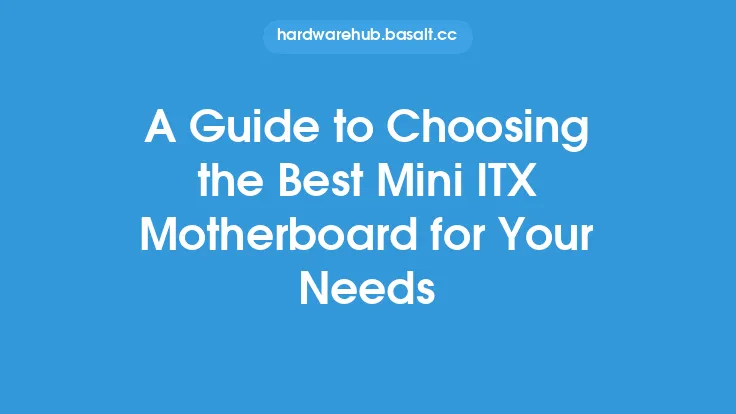When it comes to building a small form factor (SFF) PC, selecting the right mini ITX motherboard is crucial. The mini ITX form factor, measuring 6.7 inches by 6.7 inches, offers a compact design that can be used to build a wide range of systems, from home theater PCs to powerful gaming rigs. However, with so many options available, choosing the right mini ITX motherboard can be overwhelming, especially for those new to SFF builds. In this article, we will delve into the key factors to consider when selecting a mini ITX motherboard, providing you with the knowledge to make an informed decision for your next SFF build.
Understanding Mini ITX Motherboard Form Factor and Size
The mini ITX form factor is the smallest of the three main form factors used in desktop PCs, the other two being micro ATX and ATX. The compact size of mini ITX motherboards makes them ideal for building SFF systems, such as home theater PCs, media centers, and compact gaming PCs. However, the smaller size also means that there are limitations on the number of expansion slots, ports, and features that can be included. When selecting a mini ITX motherboard, it's essential to consider the trade-offs between size, features, and expandability.
Chipset and Processor Compatibility
One of the most critical factors to consider when selecting a mini ITX motherboard is the chipset and processor compatibility. The chipset determines the features and capabilities of the motherboard, such as the number of USB ports, SATA ports, and PCIe lanes. The processor, on the other hand, determines the overall performance of the system. When choosing a mini ITX motherboard, ensure that it is compatible with your chosen processor and that the chipset supports the features you need. For example, if you want to build a gaming PC, you'll need a motherboard with a chipset that supports multiple PCIe lanes and high-speed storage.
Expansion Slots and Ports
Mini ITX motherboards typically have limited expansion slots and ports compared to larger form factors. However, most modern mini ITX motherboards come with a range of ports, including USB, SATA, HDMI, and DisplayPort. When selecting a mini ITX motherboard, consider the number and type of ports you need. For example, if you want to connect multiple storage devices, look for a motherboard with multiple SATA ports. If you want to connect multiple displays, look for a motherboard with multiple video output ports.
Power Delivery and Cooling
Power delivery and cooling are critical factors to consider when selecting a mini ITX motherboard. The power delivery system determines how much power the motherboard can deliver to the processor and other components. Look for a motherboard with a robust power delivery system, such as a 6-phase or 8-phase design, to ensure stable and efficient power delivery. Cooling is also essential, especially in SFF systems where airflow can be limited. Look for a motherboard with a good cooling system, such as a heatsink or fan, to keep the components at a safe temperature.
Overclocking and Tuning
If you're an enthusiast or overclocker, you'll want to consider a mini ITX motherboard with robust overclocking and tuning features. Look for a motherboard with a range of overclocking options, such as voltage control, multiplier adjustment, and fan control. Some mini ITX motherboards also come with advanced tuning features, such as automatic overclocking and voltage regulation. When selecting a mini ITX motherboard for overclocking, ensure that it has a robust power delivery system and good cooling to handle the increased heat and power requirements.
Wireless and Networking
Wireless and networking capabilities are essential for many SFF systems, especially home theater PCs and media centers. Look for a mini ITX motherboard with built-in wireless and networking capabilities, such as Wi-Fi and Ethernet. Some motherboards also come with advanced networking features, such as dual Ethernet ports and high-speed Wi-Fi. When selecting a mini ITX motherboard, consider the wireless and networking capabilities you need and ensure that the motherboard supports them.
Audio and Video Capabilities
Audio and video capabilities are critical for many SFF systems, especially home theater PCs and media centers. Look for a mini ITX motherboard with high-quality audio and video capabilities, such as 7.1-channel audio and 4K video support. Some motherboards also come with advanced audio and video features, such as optical audio output and HDMI 2.0 support. When selecting a mini ITX motherboard, consider the audio and video capabilities you need and ensure that the motherboard supports them.
Budget and Value
Finally, budget and value are essential factors to consider when selecting a mini ITX motherboard. Mini ITX motherboards can range in price from under $100 to over $300, depending on the features and capabilities. When selecting a mini ITX motherboard, consider your budget and the features you need. Look for a motherboard that offers good value for the price, with a balance of features, performance, and price.
Conclusion
Selecting the right mini ITX motherboard for your SFF build requires careful consideration of several factors, including form factor and size, chipset and processor compatibility, expansion slots and ports, power delivery and cooling, overclocking and tuning, wireless and networking, audio and video capabilities, and budget and value. By understanding these factors and considering your specific needs, you can choose a mini ITX motherboard that meets your requirements and provides a solid foundation for your SFF system. Whether you're building a home theater PC, media center, or compact gaming PC, a well-chosen mini ITX motherboard can help you create a powerful and efficient system that meets your needs and exceeds your expectations.





